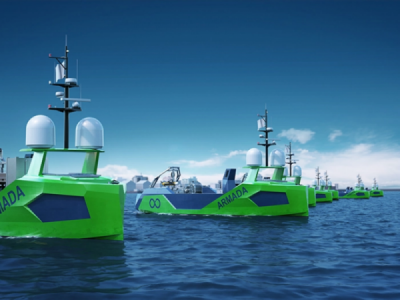
Posted on September 23, 2020
Marine robotics company Ocean Infinity, which specializes in seafloor analysis and oceanography services, has placed an order with Norwegian aluminum workboat specialist Grovfjord Mek. Verksted (GMV) for what it calls “an armada” of large, cutting-edge robot ships. The initial order is for up to 13 vessels.
Capable of completely robotic operations, each can be equipped with remotely operated underwater vessels (ROVs) and autonomous underwater vessels (AUVs), as well as a variety of other sensors or equipment. They will be remotely controlled from one of three global control centers in Austin, Texas, Southampton, U.K., and a still to be determined location in Asia.
The unmanned underwater vessels carried by the robot ships will reach depths of up to 6,000 meters and carry out surveys on pipeline routes as well as collect seismic data. Currently, ROVs need to be tethered to manned research vessels. The new fleet of autonomous surface vessels will mean that ROVs can be operated—without a nearby host vessel—via satellite from the shoreside control centers.
GMV has already started the construction of Ocean Infinity’s first four 21-meter autonomous vessels and says it is near completion of the design work on 36-meter autonomous vessels, with the same advanced technology but with increased payload capability.
The robots, which are designed to be transported worldwide by air, have been specifically designed to include highly efficient propellers, engines, and batteries, to reduce the CO2 emissions during the operation.
Dan Hook, Ocean Infinity, Managing Director said, “We are ahead of the rest of the world in terms of our commitments and ambitions for delivering low environmental impact maritime services. We spent a long time deciding who to select to build these first of a kind vessels for our Armada fleet and are incredibly excited about working with the team at GMV who bring many years of experience building highly efficient vessels for operations in the harshest of conditions.”
VOLVO PENTA AND DANFOSS EDITRON POWER SOLUTION
GMV has selected Volvo Penta and Danfoss Editron have been selected to power the vessels.
“Volvo Penta is delighted to be part of this groundbreaking project in cooperation with Danfoss Editron,” says Johan Inden, Head of the Marine Segment at Volvo Penta. “Together, we will deliver an optimized power solution—to the autonomous Armada fleet—designed for ultimate performance while reducing the environmental footprint. ”
“This is the first time that a commercial autonomous fleet is being developed, rather than just being a prototype,” says Erno Tenhunen, Marine Director at Danfoss Editron. “We are very proud to have been chosen for powering it.”
These fully hybrid-electric vessels will be powered by Volvo Penta DC gensets and Danfoss DC grid controls. Danfoss will provide the energy management system and propulsion control for each vessel while the engines behind the power management will be variable speed gensets delivered by Volvo Penta.
The Volvo Penta D8 MH variable-speed engine will power the marine generator sets on board. This all-new D8 engine is a perfect match for the autonomous vessels due to its compact size and high power to weight ratio. Additionally, the engine’s low fuel consumption plays a big role in the significant CO2 reduction.

One of the key objectives for a project like this is to deliver a reliable and efficient product. These vessels will be in the open ocean far away from land and maintenance providers. Ocean Infinity needs to know that its vessels are meeting peak performance.
Danfoss Editron, Volvo Penta, and GMV are working in close collaboration to enable the Danfoss control system to optimize the use of the Volvo Penta D8 engine for the most efficient power/consumption performance and consequently an optimal environmental footprint. The engine, the generator, and the control system work in perfect harmony.
The generator set is also designed around maximum weight savings and the incorporation with the Volvo Penta genset outlet Powerhouse has added an additional element of flexibility to ensure the delivery of the power package suitable for the vessel.
This streamlined approach to commercial deep-sea exploration will help deliver efficient operations, cut costs significantly, and reduce the harmful environmental impact sometimes associated with traditional operations.
“This contract is a fantastic opportunity for us,” says GMV’s CEO Bård Meek-Hansen. “The fact that a world-leading company—like Ocean Infinity—would choose to partner with us is a great honor, and it highlights that our focus, on design and technology development, in recent years has been right. We look forward to cooperating with Ocean Infinity, Danfoss Editron, and Volvo Penta for the development and construction of these vessels.”
The first four vessels in the Armada fleet are due to be delivered to Ocean Infinity in 2021, with the remaining robots completed in the next months.
Source: marinelog





